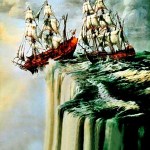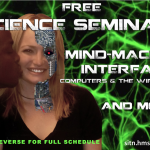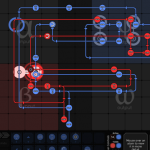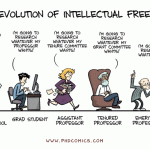education
For your reading and collection development pleasure!
Planned Obsolescence: Publishing, Technology, and the Future of the Academy by Kathleen Fitzpatrick
Academic institutions are facing a crisis in scholarly publishing at multiple levels: presses are stressed as never before, library budgets are squeezed, faculty are having difficulty publishing their work, and promotion and tenure committees are facing a range of new ways of working without a clear sense of how to understand and evaluate them. Planned Obsolescence is both a provocation to think more broadly about the academy's future and…
I've been too busy to really work on the DonorsChoose fundraiser this year, but it's worth taking a little time to mention this opportunity: Starting today and running through Saturday midnight, the DonorsChoose board will match donations to the Science Bloggers for Students fundraiser. thus, a $5 donation becomes $10, $10 becomes $20, and, well, you know how to multiply by two.
So, since you're quick with arithmetic, why not throw a couple of bucks to DonorsChoose, to help the next generation learn to do addition and multiplication, and eventually multivariable calculus? Such as, say, this…
While researching my recent post on the Nobel Prize, I discovered that the website has a series of "educational productions," including games and written/illustrated primers on different topics. I've been playing the malaria game all morning - you have to fly a mosquito around drinking the blood of humans while avoiding bug spray and mosquito nets and birds, but first you get a little lesson telling you about how malaria is transmitted.
Or play immune system defender where general macrophage teaches you how to hunt down the nefarious bacterial invaders.
The written articles are pretty good…
Tuesday was the last day of the fifth week of classes (out of ten; for reasons that passeth all understanding, we started on Wednesday, so all the week-based deadlines fall on Tuesday). Accordingly, it seems like a decent time for an update on the active learning stuff I've been doing in my classes.
Each class has had one exam at this point, and a handful of labs. In the regular intro class, we're in Chapter 5 of Matter and Interactions, about to do curving motion, and in the integrated math-physics class, which only does half a term of physics, we're just dealing with non-constant forces,…
Waaaaay back on September 20, I flew down to New York City to take part in one of the Science Online New York City panel discussions, this one on Enhanced eBooks & BookApps: the Promise and Perils (and here).
Ably organized and moderated by David Dobbs, the other panelists were Evan Ratliff, Amanda Moon, Carl Zimmer and Dean Johnson.
Here's a description of the panel:
Enhanced ebooks and tablet apps clearly offer new ways to present material and engage readers. Yet some of the software restrictions and rights deals that these ebooks, apps and their platforms use can make them unfriendly…
Alternate title: I Have an Overdeveloped Sense of Responsibility, Which Is Going to Get Me in Trouble Someday.
So, it's October, which means the annual DonorsChoose fundraising challenge is upon us. I really don't have time to do a good job of this, but having raised a whole bunch of money for them in the past, I felt bad not participating. So, I planned to do an apologetic blog post saying "I'm too busy, but give to the challenge of one of these other blogs on ScienceBlogs." Only, it turns out, there aren't any ScienceBlogs bloggers signed up.
Then I said, "Well, I'll just steer people to…
A few months ago, in practice for his first standardized testing (my three younger sons are homeschooled), Simon, my 9 year old (then in his last few months of fourth grade) took the New York State Regents 5th grade science exam from the previous year. He aced it. Actually, as long as Simon was taking it, his brothers wanted in too. Isaiah, his 7 year old brother (in second grade at the time) also aced it, missing only one question. Asher, my five year old youngest, in kindergarten, needed a little help sounding out the words, but when he was helped over the hard bits, also passed the…
"Neutrinos, they are very small.
They have no charge and have no mass
And do not interact at all.
The earth is just a silly ball
To them, through which they simply pass,
Like dustmaids down a drafty hall
Or photons through a sheet of glass.
They snub the most exquisite gas,
Ignore the most substantial wall,
Cold shoulder steel and sounding brass,
Insult the stallion in his stall,
And, scorning barriers of class,
Infiltrate you and me. Like tall
And painless guillotines they fall
Down through our heads into the grass.
At night, they enter at Nepal
And pierce the lover and his lass
From…
Computer science and computer science education are a couple of my evergreen topics here on this blog, as you can see by perusing the computer science tag.
And of course, my trip to Harvard for LIAL this past summer perhaps has that institution on my radar a bit more than usual.
So how wonderful is it to find a way to connect those two things?
Along comes Hacking Stereotypes by Steve Kolowich.
It's about a program called HackHarvard which is part of a series of efforts at Harvard to encourage technology entrepreneurship: and increase enrollments in their basic computing course,
HackHarvard,…
My 2011 summer reading was pretty meagre this year. For various reasons too boring to go into here, there wasn't much actually much vacation for me this summer. I think I'll probably have a better December/Christmas reading list than summer. Such is life.
Anyways, what I did read was pretty good, so let's get to it.
Bradbury, Ray and Ron Wimberly. Ray Bradbury's Something Wicked This Way Comes: The Authorized Adaptation. New York: Hill and Wang, 2011. 144pp. ISBN-13: 978-0809087464
Bradbury, Ray and Dennis Calero. Ray Bradbury's The Martian Chronicles: The Authorized Adaptation. New York…
"When Columbus lived, people thought that the earth was flat. They believed the Atlantic Ocean to be filled with monsters large enough to devour their ships, and with fearful waterfalls over which their frail vessels would plunge to destruction. Columbus had to fight these foolish beliefs in order to get men to sail with him. He felt sure the earth was round."
-Emma Miler Bolenius, American Schoolbook Author, 1919
One of the most enduring myths that children grow up with is the idea that Columbus was the only one of his time who believed that the Earth was round; everyone else believed it was…
Jad Abumrad, co-host of the amazing "Radiolab" just won a McArthur genius grant - a $500,000 prize with almost no limits on how to spend it.
If you've never listened to Radiolab, stop reading blogs, go download an episode sit back with a good pair of headphones. It's beautifully produced, a joy to listen to, and tells great science stories to boot. Many of my stock cocktail-party (or more often bar) stories should come with the disclaimer "I learned this on Radiolab."
The last episode on "Games," was fantastic, especially since I listened to it just after doing this year's fantasy football…
Harvard Science in the News begins its fall lecture series this week with a talk on the interface between human brains and machines:
I went to the practice talk last week, and it's going to be great! From retinal implants to controlling robots with your mind, Harvard neuroscience graduate students will take you through the science behind melding mind with machine. The lecture is tomorrow (wednesday) night at 7pm in the Armenise amphitheater at the Harvard Med School. Check out the website for more info.
Next week: Me! I'll be presenting next wednesday along with my lab mate Sky Brubaker and…
As mentioned a while back, I'm experimenting with "active learning" techniques in my intro courses this term. Specifically, I'm doing a variant of the "Peer Instruction" method developed by Eric Mazur and others. There are a few complications imposed by our calendar/ class schedule, but I'm giving it a shot, and I thought I'd report on what I'm doing and how it's going, for the benefit of readers who are interested, and on the off chance that some of my readers who are in education can give some feedback/ tips/ whatever.
What I'm doing: The Peer Instruction method is based on shifting the…
I announced the short list for the Lane Anderson Award a little while back and now the winners were announced here in Toronto a few nights ago:
Adult Titles Winner
The Ptarmigan's Dilemma: An Ecological Exploration into the Mysteries of Life by John Theberge and Mary Theberge. (McCelland & Stewart)
Young Readers Winner
Evolution: How We and All Living Things Came to Be by Daniel Loxton. (Kids Can Press)
The complete list of nominees:
Adult Titles Shortlist
Einstein Wrote Back: My Life in Physics by John W. Moffat. (Thomas Allen Publishers)
Keeping the Bees: Why All Bees Are at…
A few months ago I got an email from Zachtronics, creators of the Codex of Alchemical Engineering, about the new indie game called SpaceChem. It was billed as "an obscenely addictive, design-based puzzle game about building machines and fighting monsters in the name of science." What's not to love?
Here's a preview. . .
Science!
Game reviewer Quintin Smith loved it:
SpaceChem is a game where you build fabulous contraptions. It's about getting stuck into a massive puzzle, laughing at the optimism of what's expected of you, and then finally applying what might be the finishing touch to your…
This video from Xperia Studio very effectively conveys how data visualization can both leverage and challenge our conceptions of "reality." The night sky we've seen since childhood, like everything else we see, is just a tiny slice of the spectrum - only what we can perceive with our limited physiology. An app that lets us "see" otherwise invisible wavelengths is not merely a prosthesis that cleverly enhances our sensory perceptions, it's a tool to expand our worldview, by reminding us that what we see is only a limited subset of the whole: we could as easily see quite a different world, and…
Another issue full of interesting articles:
E-Science Librarianship: Field Undefined by Elsa Alvaro, Heather Brooks, Monica Ham, Stephanie Poegel, and Sarah Rosencrans, Indiana University
Comparison of the Contributions of CAPLUS and MEDLINE to the Performance of SciFinder in Retrieving the Drug Literature by Svetla Baykoucheva, University of Maryland
Reference Management Software: a Comparative Analysis of Four Products by Ron Gilmour and Laura Cobus-Kuo, Ithaca College
American Woods: Conservation of a Unique Item by Tierney Lyons, Penn State Worthington Scranton
Local Food Systems:…
Photo of Vermont highway courtesy of Kyle Cornell
Last week, I had my long-awaited vacation semi-ruined when, thanks to Hurricane Irene, my flight back from the West Coast was cancelled. I had to rent a car and drive across the country in a rush - not my favorite way to spend three and a half days. But based on what I saw passing through New York, and what I've heard about the damage in Vermont, I can't complain: flooding has overturned homes, isolated entire towns, and destroyed everything some families own.
Vermonters are a notoriously self-sufficient bunch, and I haven't seen that much…
"But I'm also talking about American businessmen doing what they were born to do. Make things. We've stopped making and become a country of consumers. Well, I, for one, am done consuming. And I'm ready to make." -Jack Donaghy, 30 Rock
I don't normally write about what's going on in my personal life, but this is an important development, and it affects what I do here at Starts With A Bang, so here goes.
Most of you know how a career as a physicist is supposed to go, much like any academic/science career. You're supposed to get your degree, go to graduate school and get your Ph.D., work at a…





